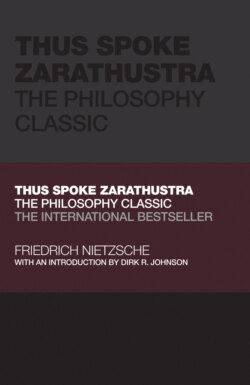Читать книгу Thus Spoke Zarathustra - FRIEDRICH NIETZSCHE, Friedrich Nietzsche - Страница 8
AN INTRODUCTION
ОглавлениеDirk R. Johnson
Friedrich Nietzsche c. 1875, by German photographer and portrait painter Friedrich Hermann Hartmann.
Thus Spoke Zarathustra arrived like a lightning bolt in the history of Western literature and thought. Nothing Nietzsche had written prior to Zarathustra foreshadowed the ambition of this endeavor. He himself commented on its singularity: the combined acuity of two hundred years, he claimed, could not have guessed that the same author of his earlier work was the visionary of Zarathustra.1
It stands out in its combination of poetry, narrative, parody, self‐mockery, grandeur, and sublimity, all while leaving its possible messages and intentions hidden from view. Zarathustra was a leap beyond anything else Nietzsche had written, but it was also a break from the history of philosophy. One need only contrast its enigmatic nature with that of the work of Nietzsche's immediate predecessor, Immanuel Kant.
Its quality of mystery has intrigued and confused interpreters. What is Zarathustra about? What is its goal? Does it have one? Does it appeal to a future higher humanity or is it merely self‐indulgent, reveling in its own allusiveness, playfulness, and literary perfection?
Part of its enduring appeal is that it leaves these questions unanswered, intentionally. At the same time, its suggestiveness has motivated intrepid readers to try to decipher its mysteries and unravel its riddles. Like a Rorschach test, it invites its readers to make sense of its countless metaphors, symbols, and images. It is intimately connected with the spirit of the time that it reflects, yet rejects that spirit, and wishes to speak to and overcome it.
For this very reason, every generation approaches the text with fresh eyes and sensibilities. While the first generation of readers saw in it a blueprint for a future humanity, a more recent generation may be drawn to its playful, open‐ended, and resonant language. Indeed, first‐time readers are often transported or overwhelmed by its evocative images and metaphors. There are those who only read Zarathustra among Nietzsche's writings, and who consider it their favorite work. Others have the opposite reaction and appreciate Nietzsche's other texts while shunning the visionary Zarathustra.
Zarathustra is indeed difficult to interpret. This task of understanding is further complicated if one is unaware of the rest of Nietzsche's philosophy. While first‐time readers can appreciate it without knowledge of those writings, they should approach the work with guarded enthusiasm and caution as well as humility. Especially if one considers that Nietzsche regarded his entire philosophical work to be a running commentary to his greatest masterpiece: Zarathustra.
